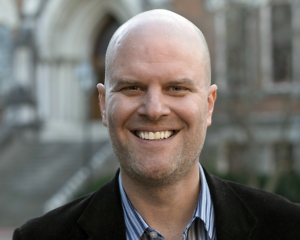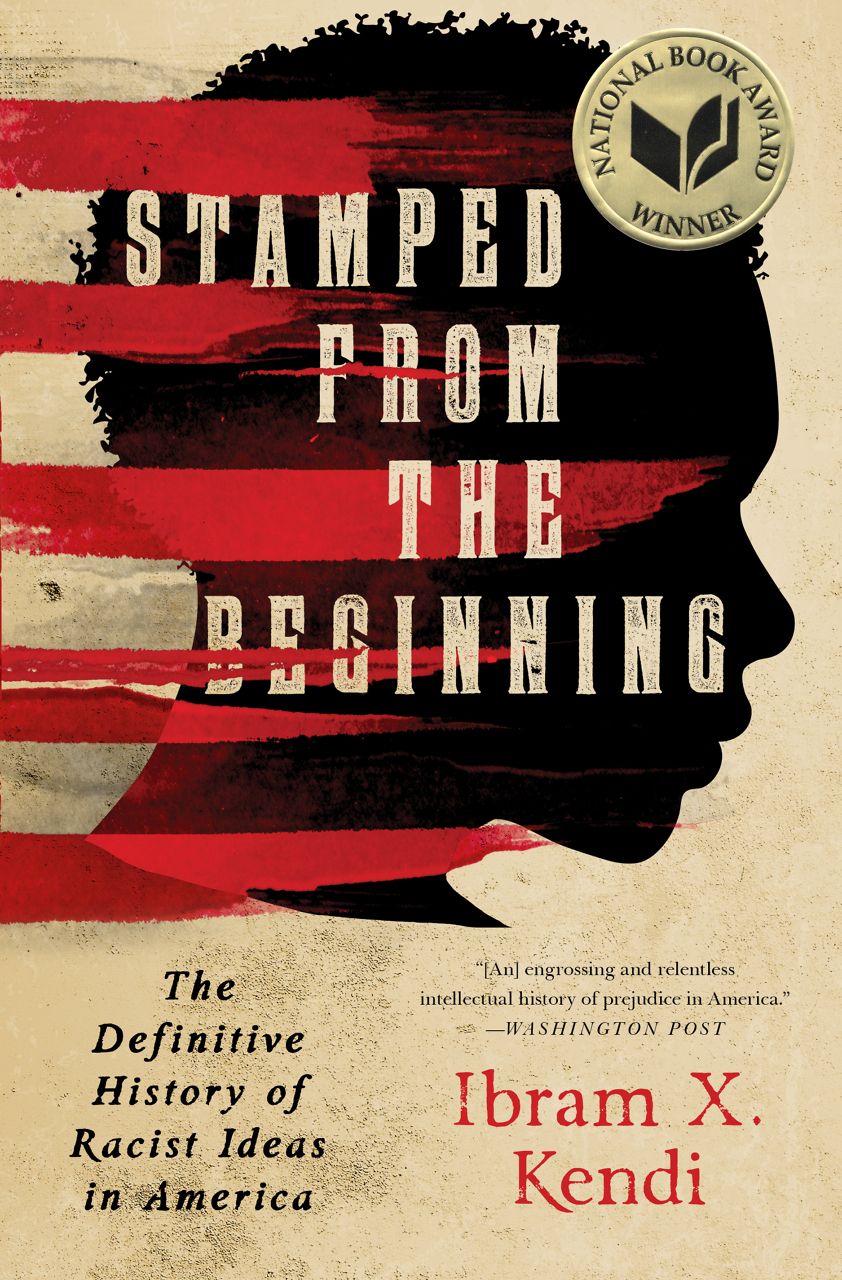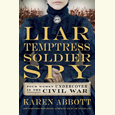Cowboy Thriller
Craig Johnson talks with Chapter 16 about his Walt Longmire series, tensions in the American West, and what it’s like to be a French cowboy
The bio on the book jacket of Craig Johnson’s latest novel is refreshingly brief, noting only that he is the author of the Walt Longmire mystery series and that he “lives in Ucross, Wyoming, population twenty-five.” What more do you need to know? Well, for starters, it’s worth mentioning that the modest Johnson has become a literary star in a seemingly unlikely place: among the famously intellectual readers of France. His first novel, The Cold Dish, was released in France in 2009 as Little Bird and won the Prix du Roman Noir as the best mystery novel translated into French for 2010.
With the sixth book in the series, Junkward Dogs, in stores (and on e-readers) this month, Johnson continues the story of Walt Longmire, the small-town sheriff who retired from big-city police life only to find himself more embroiled than ever in tangled crimes and human drama that occurs wherever the population exceeds two. This time around, Longmire faces simmering local tensions over a proposed suburb near the local dump, a possible murder or two, and the threatened departure of a young deputy whom we wants to keep on the force. Longmire’s world-weary attitude is a timeless one, but it is enlivened by a sense of humor that helps him to appreciate the absurdity of the situations around him.
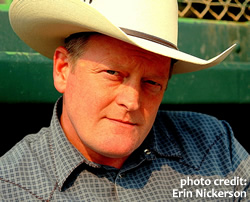 Before his Nashville appearance on June 7, Johnson answered questions from Chapter 16 about the ways that his literary alter ego has surprised him over the course of six books, the responsibility he feels as a Western writer to get the region right, and the group of French schoolboys who peppered him with questions at the Louvre, and whom he gallantly named “Les Cowboys.”
Before his Nashville appearance on June 7, Johnson answered questions from Chapter 16 about the ways that his literary alter ego has surprised him over the course of six books, the responsibility he feels as a Western writer to get the region right, and the group of French schoolboys who peppered him with questions at the Louvre, and whom he gallantly named “Les Cowboys.”
Chapter 16: Junkyard Dogs is a very funny and macabre book. Do you find writing humor challenging? Is there a special trick to it for you?
Johnson: Actually, being serious is the hard part. I set out to write a book about the more venal aspects of human nature encapsulated in a tiny town on the high plains, frozen in the middle of an endless winter. Instead, I got one of the more humorous books I’ve produced in the series. I’m still not sure how that happened, unless it was a reflexive defense mechanism. I wrote the book in the heart of a Wyoming winter which might’ve triggered the humor mechanism, and I’m sure that the ludicrousness of the situation and the oddball characters just started rolling like a snowball down a hill. Honestly, though, I think it’s just cop humor, which carries an inordinate similarity to cowboy humor in its darkness. For every serious line of thought I come up with, I have about twenty comic responses.
Chapter 16: How has the character of Walt Longmire evolved over the course of the series? Has he ever surprised you?
Johnson: When Walt stops evolving, that’s when I stop writing about him. Over the course of six novels he’s kind of come back from the brink, and that’s usually where people either evolve or die, both physically and emotionally. He’s come back to life in many of the facets of his life, personally, professionally. He decided after it all that he wanted to be a sheriff again. He has a line in the first of the series, The Cold Dish, “Good friends are like that; they remain close but don’t lose their ability to surprise.” I think that describes my relationship with Walt, too.
Chapter 16: Walt and Victoria have a classic, unrequited relationship. Do you ever play around with scenarios in which they do get together?
Johnson: Well, in a physical sense they already did in the third book, Kindness Goes Unpunished. Everyone in crime fiction warned me against letting that happen so early and that I shouldn’t let anything happen until the seventeenth or eighteenth book in the series. My response to that was—what kind of women are you dating? That’d never happen. So I went ahead and complicated the characters’ lives. Heck, mine gets more complicated every day; why shouldn’t theirs? So now both Walt and Vic are facing the fallout of this one night, and for me as the writer, it’s fun.
Chapter 16: The plot of this book revolves heavily around a new housing development in a rural area and the culture clashes that ensue. Was this plot inspired by real-life changes in the geography of the region?
Johnson: Absolutely. I write westerns, but I write contemporary westerns and the American West is a place within the throes of change. It’s become much like the rest of the American landscape in the sense that the distance between the haves and the have-nots has grown. The West has always been about distance, and this is simply a book about economic distance. It’s no secret that I base a lot of the plot lines for my books from the local newspapers, and I think that keeps the novels grounded. Mark Twain said, “Real-estate, they’re not making it anymore.” There are modern day range-wars going on in the Rocky Mountain West and that makes for social and dramatic conflict—which you hope makes for good writing.
Chapter 16: You have found commercial and critical success in France, and you have traveled extensively there to promote your books. Do you see differences between the French reader and the American? Why do you think your books resonate so strongly there?
Johnson: I changed Walt’s name to Jerry Lewis, and I think that might’ve had something to do with it … I don’t know. It’s a bit of a puzzler in the sense that of all the countries that I thought the books would take off—France might not have been the first I would’ve chosen. It could be ‘another culture’ thing; they definitely notice the differences between their society and landscape and mine. I think the American West is exotic to them and they read differently, enjoying things that perhaps the American reader takes for granted. The books are character driven, and the French love the characters.
Chapter 16: As a Western writer, do you feel a responsibility to portray the West in any particular way that either adds to or alters the myths of the region?
Johnson: With any type of genre writing, whether it’s western or mystery, you have to realize that there’s going to be a lot of baggage, but I think that’s where the humor comes in handy—for not only pointing up those connections but poking a little fun at them as well. I think the mythos of the American West is powerful enough to take a little lampooning. My readers are like cheap dates; they don’t mind being taken advantage of as long as they’re aware of it.
Chapter 16: You’re on an extensive tour with this book. Do you have any interesting encounters you can share from your interactions with readers?
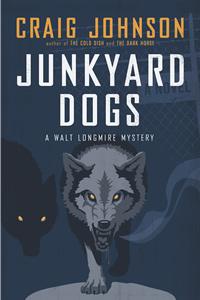 Johnson: In our most recent trip to Paris, my wife spent another afternoon in the Louvre, and I waited reclining on the steps underneath the archway Denon in the great courtyard; I like art, but I think it’s important to set limits in any relationship. I’d already traipsed through a half-dozen museums looking over the heads of Japanese tourists and their cameras, so I decided to forgo the greatest art museum in the world and, instead, do a little people watching. Of course now to watch one must be willing to be watched—that’s just the way the rules are written.
Johnson: In our most recent trip to Paris, my wife spent another afternoon in the Louvre, and I waited reclining on the steps underneath the archway Denon in the great courtyard; I like art, but I think it’s important to set limits in any relationship. I’d already traipsed through a half-dozen museums looking over the heads of Japanese tourists and their cameras, so I decided to forgo the greatest art museum in the world and, instead, do a little people watching. Of course now to watch one must be willing to be watched—that’s just the way the rules are written.
After about an hour, I was getting a little bored, so I slipped my cowboy hat down over my eyes, crossed the pointed toes of my size twelves, and closed my eyes. I’d been that way for about twenty minutes when I heard some whispering and shuffling on the steps below. I raised the brim of my hat and saw three little boys about seven years of age with their backpacks and matching red caps studying me: “Le cow-boy.”
They retreated behind the nearest hundred-and-fifty-foot-tall column and disappeared. I lowered the brim, but after a moment I heard more whispering, so I re-raised my hat and discovered that they had multiplied, and there were six of them now. When they saw me looking back at them, they scampered again.
I didn’t lower my hat quite as low this time ’cause I wanted to see if they were going to continue to multiply in multiples of three. After a moment, a pretty young woman came around the corner with, you guessed it, nine little boys, and asked in perfectly serviceable English. “Excuse me, but you are a cowboy?”
I guessed it was a reasonable question, me being out of context. “Yes, ma’am.”
“The boys of the class, if it would not be an imposition, would like to have lunch in your archway?”
I looked around at my archway, as big as the end zone on a football field. “Um, that’d be fine.”
She looked around the column and nodded, whereupon thirty or so little boys in matching red caps and backpacks came running—they completely surrounded me. The French, even the very young French, have no problems with personal space; besides, I was offered morsels of sandwiches, treats, and fruit as they peppered me with questions about cowboys, Indians, horses, and the literary life Occidental.
When my wife found me surrounded by this gang in my archway, I raised my hands and introduced the posse: “Les cow-boys.”
Chapter 16: You speak eloquently on your website about how being a young reader shaped you as a person and as a writer, and how important you think it is. Would you care to share with us anything you are reading now or have recently read that really excited you?
Johnson: My latest pleasure is a fellow by the name of Brady Udall who wrote an amazing book, The Miracle Life of Edgar Mint. He’s got another book that’s just out, The Lonely Polygamist, and I swear that if I could get hold of his grocery list—I’d read it.
Craig Johnson will appear at Davis-Kidd Booksellers in Nashville on June 7 at 7 p.m.
